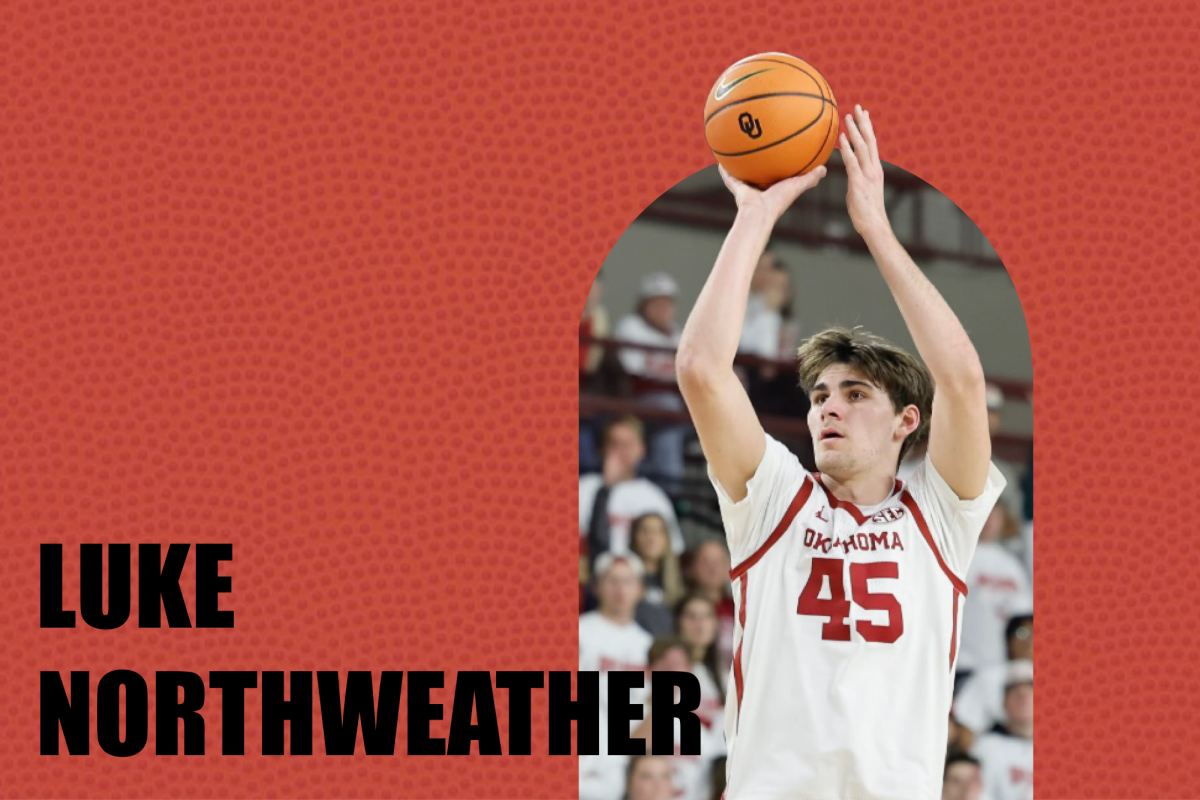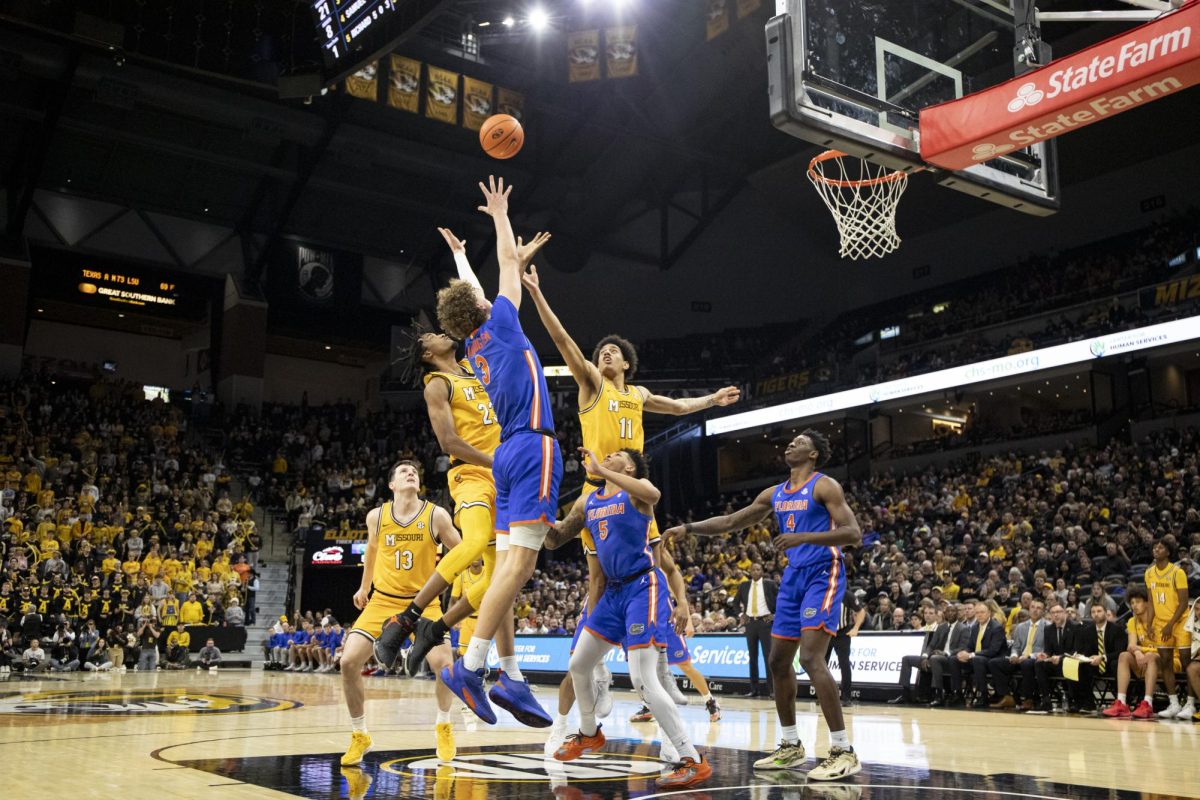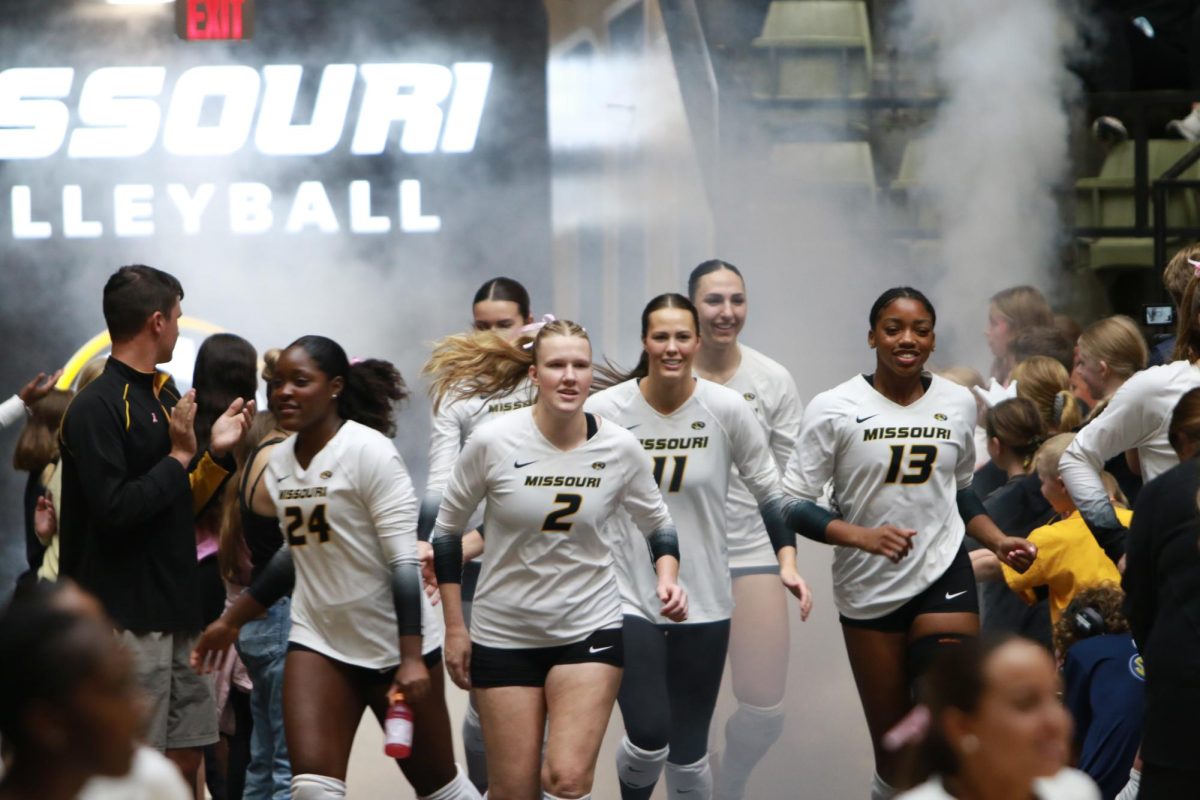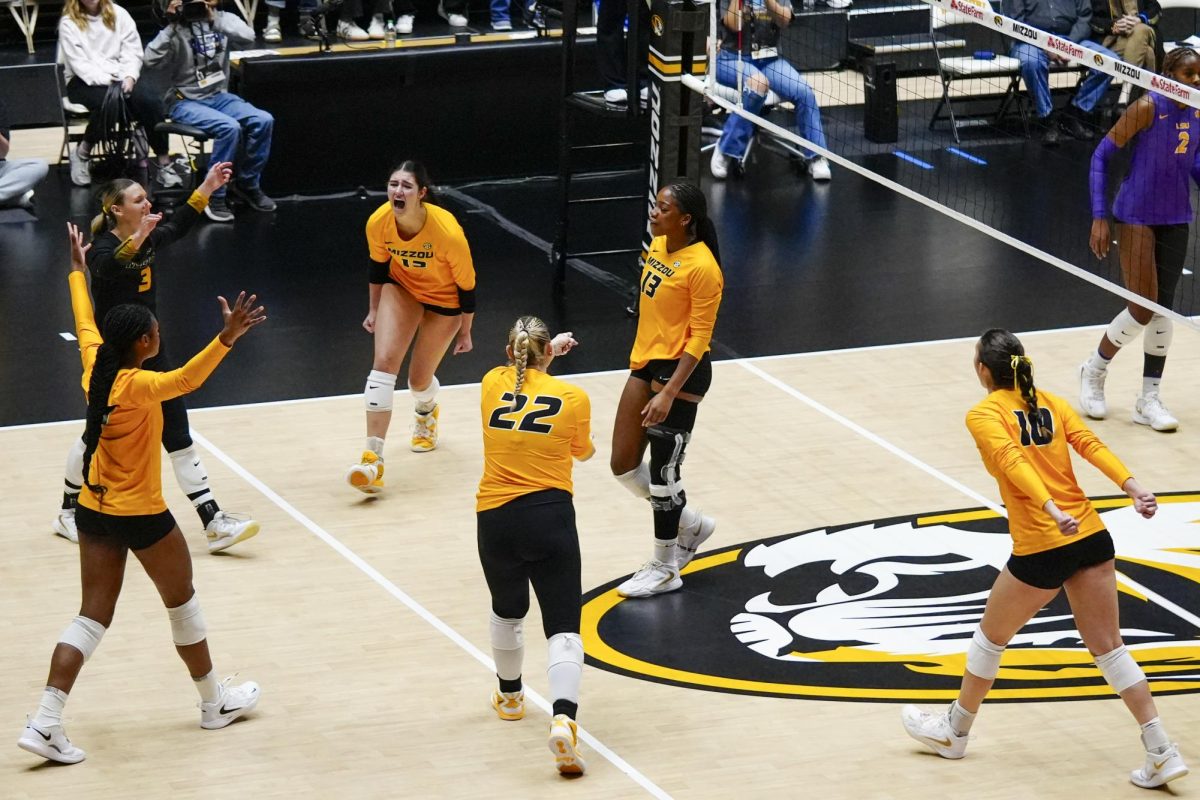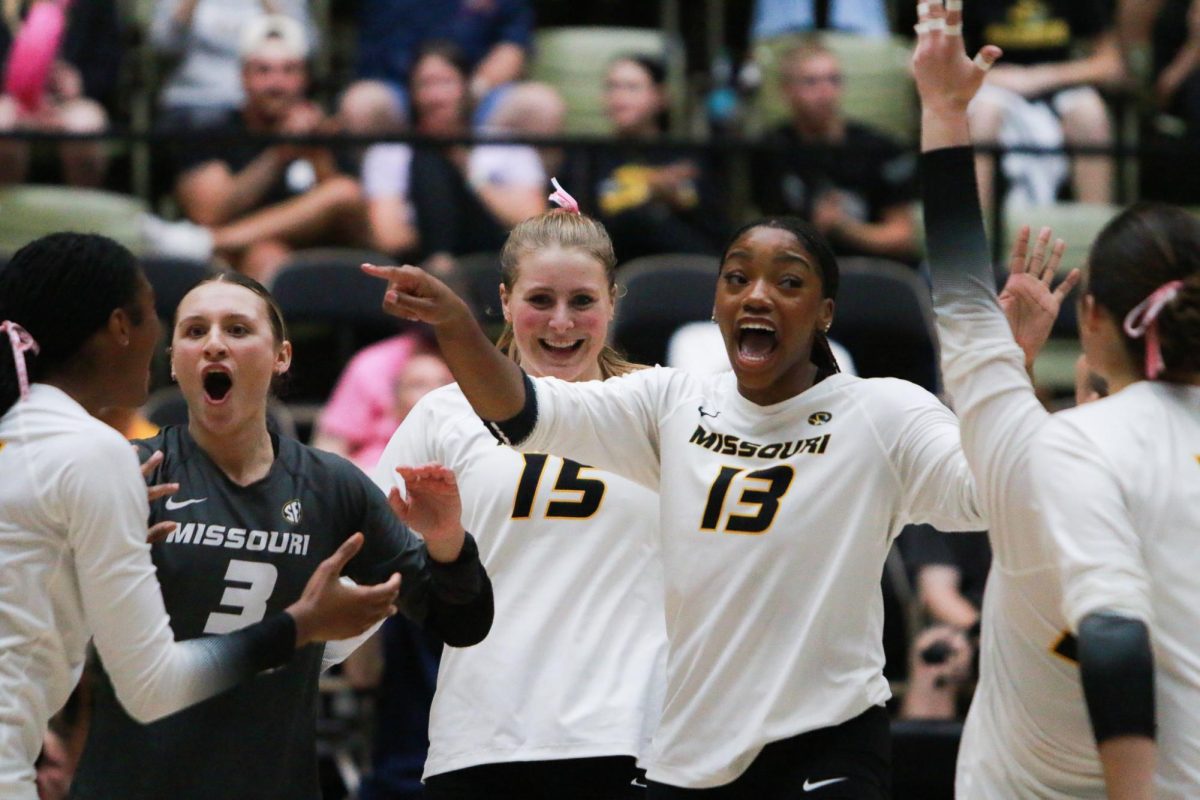The first thing you notice about Jordan Wilmore is his height.
Missouri men’s basketball’s lone freshman has always loomed large above normal-sized folk. In kindergarten, teachers had to bring in a desk from one of the sixth-grade classrooms to accommodate the hulking five-year-old.
He quickly grew from a kindergartener who sat at the sixth-grade desk to requiring an entire table to himself at the back of the classroom so other students could view the whiteboard. His high school wore uniforms, so he worked hard to earn special uniform privileges — just to wear clothes that fit him.
On the court, now 7-foot-3, he is the Willis Tower who looms over the gargantuan college basketball skyline. He’s the tallest player in the history of Missouri basketball and stands as one of the biggest players in the nation.
But Brenda Wilmore’s son isn’t just defined by his size. He’s defined by his outsized role in his community.
“I always instilled in Jordan, ‘I don’t care which city you’re living in, where you are, you can find something that you can do,’” Brenda, Jordan’s mom, said. “You know someone that you can help. I don’t care if it’s a meal, if you go to pay for somebody’s lunch, just something that he gives back.”
Jordan hasn’t lived with his mom since his junior year of high school, but her teachings manifest themselves by paying ahead for customers in the Starbucks drive-thru or volunteering alongside his high school teammates in the Memphis, Tenn. community.
“I just do whatever I can to help,” Jordan said. “Everybody has different stories, everybody comes from different spots, so anything I can do to help puts a smile on my face and also helps to put a smile on their face.”
When Jordan hangs up his size-17 sneakers for the final time, he wants to make a career out of volunteer work by helping homeless people and foster kids find food and housing.
But until that dream manifests itself, he is Missouri basketball’s resident Good Samaritan who radiated excitement when he realized he could pay ahead for people at Starbucks and gave up his holidays in high school to help people.
“He genuinely cares about people,” Brenda said. “Not just unfortunate people, but he cares about everyone.”
***
In many aspects, Jordan is a mirror image of his mom. She’s tall, too — 6-foot-1 — and learned to give back from her own mother.
“We’ve always been that type of family that loves one another,” Brenda said. “We understand the importance of family, and their grandmother was a great person that installed that in them that family is first.”
Kindness trickled down through the generations of the Wilmore family. Brenda’s mother, Ethel Bradley, earned a living as a social worker and carried her soft spot for children back to the house. If anyone needed some shelter and a warm meal, Ethel would provide it.
“Whenever I would come home, there was always a child there that needed somewhere to stay or some food,” Brenda said. “On holidays like Christmas, I would see my mom just open up our house and have people come if they didn’t have food. I saw that people came who were in need, but she never made a big fuss over it.”
Brenda soon involved herself in volunteer work. She started by working with her church to serve dinners, helping out wherever she could.
In the meantime, Brenda grew curious about becoming a foster parent, which was essentially what her own mother did on so many occasions, just formalized.
Curiosity turned into action once Brenda graduated college and received approval to be a foster mom at 21 years old. Just like her mom, Brenda opened her home to children ranging from a one-day-old baby to four-year-olds who were awaiting permanent housing with their parents or another relative.
At the beginning, Brenda had some reservations. She didn’t know if she met the requirements. However, Ethel knew her daughter met all the criteria on the application and helped her through the process to become a foster parent.
Brenda remembers eight or nine kids who resided in her house over the years until she was pregnant with Jordan. By that time, she already had two adopted sons, Troy Wilmore and Kendale Thomas.
She thought four kids would be too much. But Jordan attempted to push his mom back into becoming a foster mom through the day he left his childhood home to complete his senior year of high school in Memphis.
“I have thought about it and Jordan has been asking me,” Brenda said. “I remember he was in high school and he kept saying he wanted a sister. He said, ‘Mom, you should be fostering again.’”
Since Troy and Thomas are seven and nine years older, respectively, than Jordan, the youngest of the family became curious about his brothers’ experiences in the foster care system. As Jordan got older, he started to realize that helping out foster kids was his calling, too.
“I know how they went through the process,” Jordan said. “As I got older, probably middle school, I knew that was something I wanted to do.”
In conversations with his mom about the foster care program, Wilmore couldn’t believe that some kids stayed in foster care from a young age until they turned 18 years old. At that point, foster kids are sent out into the world on their own.
Jordan found his mission: to make sure that all foster children have homes before emancipation.
“He wants to make sure that every that there aren’t kids in the foster care program or that they’re not they’re not there for long,” Brenda said. “We used to talk about how some kids don’t make it out of the foster care program, so I think what he wants to do is try to make sure that no kid is left behind.”
Since opportunities to visit foster homes are limited, Jordan hasn’t interacted with foster kids outside of his brothers.
But once he’s old enough and has acquired more knowledge about foster care, Jordan intends to support foster kids in search of a family by creating his own business focused on improving the screening program while becoming a foster dad himself.
“I can encourage other people to do it and take in the people who don’t have families from stuff I learned from my mom and my brothers,” Jordan said.
***
Jordan started volunteering at a century-old brick-laden church, about 15 minutes outside of Baltimore.
There, he quickly learned that there were people less fortunate than his family. Jordan wanted to learn more about the conditions of the people he met at the church or around Baltimore, and what could be done to improve their lives.
“I think he was more wanting to get more in-depth with why certain people are the way they are or their circumstances,” Brenda said. “He’s very compassionate in wanting to know how we can help them get better on their feet.”
Once, Jordan spotted a panhandler on the street whose clothes were dirty and tattered. He went home to fill a bag up with hoodies, t-shirts and anything the man might have needed, then returned to give the man his own clothing.
Some shoes would have been thrown in as well, but size-17s aren’t the easiest to pass along.
When Jordan was in middle school, he was leaving Walmart with his mom when they saw a mother and her baby in the parking lot. Brenda noticed them when she heard the baby crying. The woman approached Brenda as they were loading up the car.
The mother asked Brenda if she could spare some money, but Brenda wasn’t carrying any cash so she didn’t have anything to give her.
Her son had a plan.
“Jordan is looking at me like, ‘Well we can go get some,’” Brenda said.
The Wilmores ventured back into Walmart, emerging with a meal from the McDonald’s located inside, some groceries and extra cash.
“Even if someone comes to me and asks me for a couple dollars, I’ll give them the last couple dollars I have,” Jordan said. “Anything just to help.”
***
For his senior year of high school, Jordan transferred from DeMatha Catholic High School in Maryland to Whitehaven High School in Memphis, just two-and-a-half miles down the road from Graceland. As soon as he entered his new stomping grounds, he was Whitehaven’s version of Elvis.
“You would’ve thought a celebrity was walking through there,” Brenda said. “They had an assembly and we had to walk through the auditorium to get to the office to register for classes. You could hear a pin drop when he walked through.”
Jordan was not just the main attraction on the basketball court. He was the main attraction all around campus, from the hallways to football games. Everyone young and old wanted to know the mountain of a man who spoke without a Tennessee twang.
“He would stand on the sideline during the football games and all the little kids would run up to him and grab him on his leg,” Dr. Vincent Hunter, Whitehaven’s principal, said. “You know what he would do? Hug each one of them and he would sign autographs.”
Whitehaven’s newest commodity lived the rockstar lifestyle in the Birthplace of Rock ‘n Roll, but he never let the perks of popularity replace what he learned 900 miles away.
“He never became so full of himself that he didn’t forget about how important it is to be humble, even though he was still a teenager,” Hunter said. “He never changed who he was and he had a very contagious smile. Those things don’t come to a school but maybe once in a lifetime.”
***
Living fairly independently near his aunt and uncle, Jordan took some time to adjust to his Memphis life.
But soon enough, he felt right at home giving back to his classmates by putting a smile on their face with jokes and mixing it up with future NBA No. 2 pick James Wiseman on the court.
His new coach, Faragi Phillips, built a culture ready-made for Jordan to not only thrive on the court but in the Memphis community. Jordan often spurned lunch in the cafeteria to eat with Phillips.
It was in those lunch sessions where the two built a strong relationship in a short amount of time.
“He really cared for Jordan while he was there, so I was very appreciative,” Brenda said. “He knew my concern of having my baby boy so far away in a different culture that he’s not used to.”
A mutual love for community work facilitated the relationship between Jordan and Phillips.
Each year around the holidays, the Whitehaven boys basketball team fed those in need. It was something Jordan didn’t know about when joining the program, but Phillips gave Jordan an avenue to pursue his dream of running his own program for helping the hungry and people without homes.
Jordan stayed in Memphis over Thanksgiving and Christmas instead of returning home to Maryland, spending the holidays fixing up plates of food and handing out baskets to community members in need.
“They’ll always go out, always give out food and stuff,” Jordan said. “It’s just something they did on the regular. Even the coach encouraged us outside of school and basketball to always give back.”
While Jordan might have moved to Memphis for basketball opportunities, Whitehaven’s focus on giving back to the community aligned with his humility of heart and gratefulness to make his time in Memphis even more special.
“Usually athletes dictate the culture and climate of your school,” Hunter said. “We try to make sure our student athletes understand that no one owes you anything and it’s important to stay humble in all your endeavors. That’s why I think going out to feed the homeless and visiting the nursing homes was so important, not just for Jordan and not just for our basketball team, but for Whitehaven as a community.”
***
After graduating from Whitehaven, Jordan spent a year training in Atlanta at Skills Factory Prep. It was there that he started to think about attending Missouri, a program he felt embodied his mother’s teachings and the team identity Phillips developed at Whitehaven.
Jordan said he knew MU was the school for him almost immediately. While Brenda took care of making sure Missouri was a good academic fit, Jordan met with head coach Cuonzo Martin, assistant coach Chris Hollender and the entire team.
By the time Jordan, Brenda and Jordan’s uncle, Dujuan Taylor left Columbia, Jordan knew he would be back to stay for good.
“The second day, I asked him, ‘Are you sure you don’t want to go somewhere else and look?’” Brenda said. “He was determined. He said, ‘No, I want to be here.’”
Missouri’s team is filled with veterans — most of the players who are joining Jordan have at least three years of college experience. Jordan hasn’t seen the floor as much as he did at Whitehaven or Skills Factory Prep, but he fits in with the culture Martin has built at Missouri.
“He understands he’s a true freshman and he knows his role right now is to learn,” Brenda said. “I tell Jordan to study because you may not see the floor as often as you would like, but take this opportunity to learn from the upperclassmen and learn from them and get to see their role.”
Brenda looks for Martin to be a mentor to her son both on and off the court, just like Phillips at Whitehaven. The two coaches are similar enough: They live up to Brenda’s lessons of unselfishness and avoiding jealousy.
When Brenda talked with Martin about her son, she told him about the importance of volunteering in Jordan’s life and how he needs to be active in the Columbia community.
COVID-19 has affected the amount of work Jordan can do around Columbia, especially during the season. Stringent safety measures try to keep programs out of harm’s way, which eliminates many opportunities for Jordan to volunteer.
But once a semblance of normalcy returns, Jordan’s ready to community involvement and get his teammates involved as well.
“I brought it up and I will for sure,” Jordan said. “I’ll get everybody active and doing it.”
Of course he will. Much like his height, that’s just the way Jordan Wilmore is built.
_Edited by Jack Soble | [email protected] and Kyle Pinnell | [email protected]_



